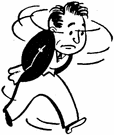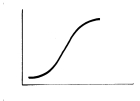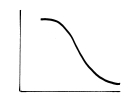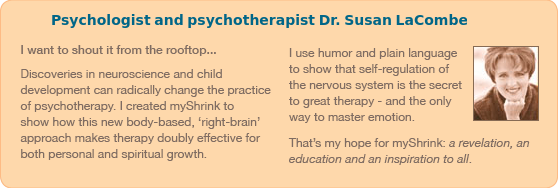Emotional baggage—that backlog robs your energy, your aliveness, meaning and purpose in life.
Here's the beauty of a holistic, somatic approach.
As clients expand the nervous system they have one thing in common - they get better at letting go of the past. . . of negative thoughts and the effects of deep triggering wounds.
Can't let go of an ex-partner or the past?
Few people know that the biggest contributing factor to having trouble letting go with old relationships has to do with the way the brain and nervous system function. That's good news because it means there's a measure of control you can gain by merely working somatically (ie. via the body).
In my clinical practice all clients receive body psychotherapy. By working with the body, you're actually tapping directly into the nervous system.
How to Deal with Merry-Go-Round Thoughts
Do you feel like you just can't let go of some things. Some thoughts circle in your head for hours.
You push the idea away but it comes back?

Read on for an interesting hypothesis for why this occurs and what you can do to stop the thoughts. You may be surprised.
Emotional Release and your nervous system
Physiological discharge is a natural process in which the nervous system let's go of energy. Individuals whose nervous systems are better at discharge have fewer bouts of feeling keyed up or restless. And, they have an easier time letting go of things that bother them including muscle tension and stress.
You are familiar with common forms of discharge but you've probably never thought of them in this way. They include a good yawn (especially shudder-type yawns), heat, twitches, giggling, and tears.
Common forms of discharge include a good yawn (especially shudder-type yawns), heat, twitches, giggling, and tears.
The nervous system is releasing all the time, even when we're asleep. We notice the discharge process is working only through a sense of decreasing tension in our nerves and muscles.
Emotional Release and our sleep
Do you wake up feeling refreshed in the morning? It's usually because excess energy of the previous day was effectively discharged from the nervous system.
But a good night's sleep is only one way to optimally discharge, although it's the most common and natural. Some people help the discharge process through aerobic exercise, others through yoga and mindfulness meditation.
Have you ever gone to bed and just as your head hits the pillow you get this "whole body jerk"? This is the body's response to suddenly calming down. The body twitch enabled a quick release of energy, a discharge.
Release occurs seamlessly
But normal release happens quite seamlessly. What few people know is that it's possible to improve the discharge process. This enables one to calm down easier from stressful events and the hassles of everyday living.
We all experience stress in our lives. However, some people are able to quickly return to a baseline level of comfort. Others can't let go of the stress. The stress effects on the body remain long after the event. They show up in physical areas like tight shoulder muscles, a heavy chest or soreness in old injuries
Holding On and Letting Go
Not everyone has a healthy way of discharging bound up energy. Think of someone who's a chatterbox, who talks incessantly. These verbal dischargers nonconsciously--yet adaptively--use talking as a way to deal with their nervous system's activation.
And we're all familiar with the phrase, letting off steam. Can you see now how close to the literal truth this metaphor becomes?
If you have a hard time letting go, of letting go of stress and your emotional responses, you might find the following section of interest.
To best appreciate the importance of discharge it's helpful to understand how the nervous system works normally.

The sympathetic nervous system causes our felt level of arousal (i.e. our activation) to increase in response to anything stimulating. For example, watching a suspenseful movie, dealing with an angry boss or feeling pressed for time are all instances of stimulation that naturally increase our arousal.
The parasympathetic nervous system acts to discharge the energy created by the sympathetic system (i.e. our activation) and thereby reduces arousal levels in the nervous system. The parasympathetic nervous system has done its job when we feel relaxed.

A new way of looking at letting go
What few people realize is that if your body has trouble letting go, you will have trouble letting go of thoughts and triggering memories. In fact, the more your body is wound up and not discharging properly, the more likely you will be stuck in your thoughts. You won't be able to shut off your brain!
Letting go (i.e. discharging) is necessary for relieving stress. If your nervous system has trouble letting go, the excess energy gets stored in your body, through holding patterns in the muscles and fascia.
But this doesn't mean you have more energy to live life. As anyone who feels chronically keyed up will confirm, you generally have less energy. There are good reasons speculated for how this occurs but simply state, it takes energy to hold energy. That is, the body expends energy in an effort to keep the body on guard or on alert. We feel it as being "keyed up".
Sign of a healthy nervous system
A nervous system that's not working as it was intended does not release its accumulated energies smoothly. In contrast, a healthy nervous system discharges easily and seamlessly.
So for example, if you have a healthy nervous system you will settle down quickly after a stressful experience. You will also be able to relax for extended periods of time without feeling restless.
Most importantly, if our preliminary hunches are correct, if you experience a traumatic event you are less likely to develop trauma symptoms.1
How do you improve your ability to release?
The way I'm most familiar with is through somatic or body psychotherapy. Body psychotherapy teaches you how to track and work with the activation in your body. Through the help of an attuned and regulated therapist you can train your nervous system to change the patterned way you respond to stress.
However, temporarily you can give yourself a much needed break from incessant thoughts by doing activities that relax you. Not everyone can relax in the same way however. So, when I suggest mindfulness mediation, having a bath or doing yoga, these activities will only work if your body is ready for that.
These are the kinds of recommendations I give in my DeCoding the Brain where I teach members how to release naturally.
Over the years I've learned a lot about emotional release from my clients. Check out this short article to learn more about it:
References
Heller, Diane P. (2001). Crash Course: A Self-Healing Guide to Auto Accident Trauma & Trauma Recover. Berkely, California: North Atlantic Books.
Levine, Peter, A. (1997). Waking the Tiger: Healing Trauma. Berkeley, California: North Atlantic Books.
Scaer, Robert, C. (2005). The Trauma Spectrum: Hidden Wounds and Human Resiliency. New York: W.W. Norton & Company.
Notes
1. I believe it was Peter Levine (Waking the Tiger ) who was first credited with this association. I've certainly seen a related correlation with discharge in my own practice. Clients who have experienced substantial trauma in their lives appear less able to discharge energy than clients with less traumatic histories.
Readers Comments

Colleen
Can medication help?
Hi In 2009 I had 5 major surgeries with mutiple complication, infection and a lenghty hospital stay. On one of the surgeries I ran off the floor and could not accept that I had to have another surgey that was number three within 10 days or so...
I am still having problems pelvic cramping...I go to physical therapy, see a therapist and have tried many medications with no results. However during PT I begin to shake my whole body. My PT has told me it is the releasing of the freezing stage of the fight and flight mechanism that I was not able to realese during surgery.
I know I need to release it however is there any medication that can help decrease it so that I can get through therapy. Any help would be appreciated. I live in a hyperarousal state, I'm a RN on the night shift which was the worse time for me when I was hospitalized.
Any help would be appreciated. Colleen, Philadelphia

Forster
How to stop discharge?
ok i need answer for the stop of discharge.
forster (west africa, ghana)

Shrinklady
Well actually Forester, discharge is an essential part of the regulatory process of the nervous system. It's a good thing!
You see, if the nervous system has a hard time discharging and/or it's prevented from discharging normally (these tend to be pretty tense folks), it tends to back up the energy. Then the body starts to experience negative side effects one of which is a high level of muscular tension.
With sufficient discharge and release, the nervous system will induce a noticably calmer feeling throughout the body.
In my Brain Coaching Program I encourage folks to allow the discharge process to happen naturally. Indeed, it's so much easier if you just give yourself permission to let yourself move through it. The more you can allow discharge, the faster it will release and return you to a balanced state.
It's often our fears around the "sudden" discharge and the accompanying tensing up that provokes the process into a negative feedback loop. The fear ends up just re-triggering the body. That's why it's important to just relax into it.
Grounding through your body sometimes provides relief (although admittedly, it can just as easy be the trigger that starts up the discharge process).
If you're on medications it's important to know that they can sometimes trigger discharge into the negative feedback loop I described above. I've seen clients on medications with hands that continue to shake for hours for instance.
Hope that helps Forester and I wish you best on your journey,
Shrinklady

Victoria
When discharge happens now I let it.
I learnt really great things on your Brain Coaching Program. Thanks much. When discharge happens now I let it, follow what you said, and it really helps.
Victoria

Shrinklady
That's super Victoria. Yes, we just need to allow it to happen. I often tell clients, "we need to get out of our own way".
Glad to hear the Program's working for you.
Best,
Shrinklady

Marilyn
To listen and not say much is becoming a problem
I have a friend at work who vents her life issues to me EVERYDAY. I don't mind, at times, but sometimes I feel overwhelmed by them. I usually can never get a word in or cannot relate any type of my issues to her because it seems that her attention span shortens when she is not talking. This has gone on for two years now.
I consider myself to be a great listener and I consider to have great advise at times, but when she does not let me finish my sentence before inturrupting, or somehow shifts everything back to her, I've just learned to listen and not say much. It's becoming a problem.
What can I do, what do you suggest?
Marilyn

Shrinklady
Marilyn what do you say to being more honest with this individual in a way that's authentic and caring? There's a good chance, the woman is unaware of the full impact she has on others. Even if she senses something is off putting, until she becomes more aware of it and it is brought to her attention, she will have limited incentive to change.
I strongly suspect that this woman is chatting incessantly to regulate her nervous system. She's verbally discharging. The reason she doesn't seem to allow you to have an exchange with her is that she's "in procedure". And she's so pent up, she's barely breathing herself.
That said, even if you're able to call attention to how she impacts you with the way she talks, this patterned response will be hard for her to break. She may know she's a "chatterbox" but she may not know why she does what she does. She probably won't have much ability to stop it neither, at least not without a meaningful connection.
It's like a really bad habit. Those of us who have dysregulated nervous systems use different ways of discharging: extreme sports, addictions including extreme fitness, compulsive shopping etc. Verbal discharge is a little known one.
I suspect that over time she has experienced increasing alienation from others - she probably already sees that people fade away, zone out etc. around her and at some level, she no doubt has a sense she's not really liked. However, she may not know why they pull away. In fact, she may falsely attribute her alienation to reasons unrelated to her chattiness.
The problem would no doubt worsen as she recognizes that people are pulling away. In fact, this situation would only intensify her distress and increase her verbal discharging.
On the positive, I do believe the way you approach her with the problem will go a long way towards her being motivated to change it and to having a greater awareness to it. It is very possible that if she feels someone is sincere and taking a risk to reach her, she may in time become more conscious of her pattern. It's our greater consciousness of these types of patterns that creates the opening for change.
However, before we go there, Marilyn, I want to caution you about something. By now, you've probably built up a lot of pent up frustration. I feel it's important that this be owned by you.
You see, you have not said anything until now. Anything you might say at this point should take this into account. That is, "blasting" this woman with all your anger when you haven't said anything before might provoke quite a lot of resentment. I don't imagine you intend to do this but I point this out because I know that it becomes harder to rein in one's anger the longer a problem persists.
Now, I think there's a reason you haven't said anything and I believe this has to do with your own history and expressing your own needs. This is where your own therapy can be useful.
If you're planning to work alongside this woman I suggest you attempt to bring the discussion into the "present moment.
Here's what I mean.
You might begin by impressing upon her that you feel at a distance from her. For instance, you might share how you feel shut out from her and that you feel you are not connecting.
So in essence, you are expressing a desire to be closer to her but finding that hard to create. You might add that you're not feeling heard by her although you're not blaming her for this.
What I suggest may take some courage Marilyn and if you can manage to do it and it works out, you may find your coworker easier to be around.
Let us know how it works out for you,
Best,
Shrinklady

JC
Discharging during sleep ok?
Hi Shrinklady, if we discharge during our sleep, will it be affected if we're aware of that? Eg. knowing it gets in the way of the discharge that happens naturally when we don't know? Thank you for your site.
JC

Shrinklady
Thanks for your question JC. I gather you're asking if being aware of discharge affects the outcome.
Being aware of discharge will not normally affect its natural course unless we consciously intend to interrupt or change it. The problem is when some folks become aware that their body is doing something they didn't intend and it becomes disturbing to them. They're not used to the normal workings of the body. They tend to freak out and figure something "bad" is going on.
It's not their fault. Our society has become so left-brain, we've become distanced from our own body-based selves. We're not familiar with the normal workings of the nervous system.
For example, folks with high activation often report that when they lie down to sleep, sometimes their whole body jerks. This is a normal reaction. Discharge can happen quickly when we drop a couple levels into a more relaxed state as we do when our head hits the pillow. Yet, they view it as something out of the ordinary.
Moreover, the higher the nervous system activation the more "on guard" we tend to be about the supposed "strange" workings of the body. We end up making false interpretations about what's happening: "Oh, my body shouldn't jerk like this. Maybe I'm having a seizure?"
Are there instances where awareness to discharge affects the outcome? Absolutely. If we get freaked out, we may interrupt its natural course. But it doesn't matter. The body will catch up next time around.
So, JC if you happen to awaken to the normal discharges of your body, take delight in knowing your body is doing what it needs to do.
Hopefully this answers your question,
Shrinklady

JC
Hi Shrinklady, thank you. You gave a really clear explanation.
I did try the exercise on the Discharge page. It seems that I had more difficulty doing the breathing in part. I'm hoping more practice will help? I've heard breath is related to "life" so I was thinking maybe deep breathing and good breathing helps you to also live life more deeply and fully and the psychological state on that will also change. What do you think?
I guess singing or acting, writing, drawing can all be forms of discharge too. Although I've always wondered if the emotions you use in acting stay locked within your body/nervous system, which wouldn't be good or it is actually discharged?
Do you have any recommendations on where I can read more about discharges? I find it very interesting when you explain how sighs are a catch-up maneuvre. And how the signs lets go of carbon dioxide built up within the body. I never thought of it that way It's quite hard or I don't know where to find such information normally.
Thank you again for your lovely article, I hope there will be more to read.

Shrinklady
Well those are some mighty fine questions you've given me JC. I can't promise to answer all of them. I came across a few facts that I thought you might find interesting. Apparently according to the ancient yogic texts, we are meant to live 120 years and a critical factor is the use of our breath. The giant tortoise has only 3 breathes a minute and lives 180 years. Monkeys have ~30 minutes.
Something to think about eh?
I would think that singing improves discharge. I notice though (personal experience) that the singers who can't project their voices appear quite activated. With practice, I suspect that not only does their singing improve, but I'd bet their breathe deepens and their activation comes down. (Tip: practice wailing in the shower.)
I would say the same goes for acting. The best actors "live" their characters through their whole body. Whatever emotion they're acting out, they're also feeling it. Bad actors are way too activated. They probably get triggered--and exhausted--by their acting. Again, I would imagine practice would help.
In both cases however, whether the singing or acting provides a way to discharge depends on how regulated the nervous systems is. If an actor takes on a scene that is so triggering, well then, that might just back up on them. They just might go into freeze in which case there is little discharge.
In any of these activities, I would think that if done in a titrated way, they'd be beneficial. For instance, writing in your journal might be triggering or soothing depending on how deep you're going, the topic you've chosen and how long you do it in any one sitting.
I'm sure there's lots more to say about it but these are a few of my thoughts.
Shrinklady

Elaine
Feel a renewed sense of calm in my body and mind
Just one more thing. I keep coming back to this website, because there is material here and insight and knowledge that I have not found anywhere else. I am going to sleep now, and peacefully so, since I just practiced the breathing exercise with you and feel a renewed sense of calm in my body and mind! This is NEW to ME. Your voice is soooo soothing. Thank you so much!
Elaine (Shrewsbury, USA)

Shrinklady
Good night Elaine
Shrinklady

Elaine
I think my life just changed. Just by understanding
This was wonderful for me tonight. Just by doing the breathing exercise I gained valuable awareness of how much my parasympathetic patterns of not being able to discharge rule my life. My body has suffered as a result of being unable to let go. So THANK YOU for helping me do this. I think my life just changed. JUST BY UNDERSTANDING, which is what I was seeking when I read this webpage....Blessings to you!!
Elaine (Shrewsbury, USA)

Shrinklady
Oh, I'm so pleased it helped Elaine.
I'll be posting more about these types of techniques down the road. So, please keep in touch.
Shrinklady


